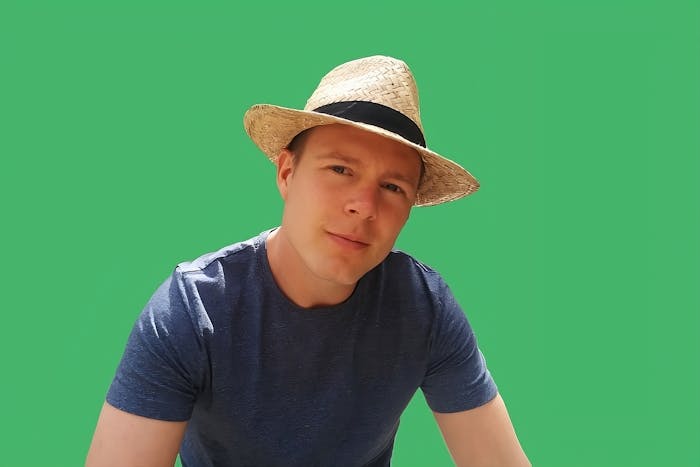35-year-old nomad puts 85% of his wealth into Bitcoin to escape a collapsing financial system: "Get out while you
can."

35-year-old Martin Baun is a digital nomad with a software agency and a fledgling product.
Or at least, he was a digital nomad. He went from Spain to France to Poland, but then decided that he wanted to settle down.
First, he tried Kyiv. He liked it there until he got bombed. He says he "disliked getting bombed" and decided to flee to Bulgaria.
He settled there for over a year before deciding to take a quick trip to Colombia to escape the cold Bulgarian winter.
And while in Colombia, he met the woman of his dreams. So he finally hung up his nomad hat.
Now, he's buckling down on his product and services. He has six months of runway left, but funding his product is putting him in the red.
Let's take a peek at his finances.

Fund your product with services
Martin keeps the lights on with BaunIT, his software agency. He and his team can do a little bit of everything, so he often helps clients go from idea all the way through design, development, and into maintenance.
He’s been running this business for over a decade and, along the way, he got frustrated by how bad — and expensive — project management software was. Out of desperation, he began “dabbling in indie hacking” and built his own project management product called Goleko.
Here’s what he’s bringing in:
Goleko revenue: $0 (pre-launch)
BaunIT revenue: $80k-$150k per year
Goleko funding: BaunIT revenue and personal savings
Founder pay: $0
Bank account: Six months of runway.
BaunIT is funding Goleko’s development and is, therefore, no longer profitable — mostly due to new hires and marketing.
So he stopped paying himself about four months ago.
He’s okay with that. He has runway, and he sees it as an investment. He says, “You’ve gotta give some to get some when you run a business.”

Invest in a team
Expanding his team may have put him in the red, but he’s a big proponent of this type of growth. He says having a team is fundamental to what he does.
I invest in my team. When you have capable employees, you get a lot more done by delegating. And you can focus on scaling your company.
It's the only reason he's able to put 80% of his time into Goleko. He says the team keeps them at “triple time, as it pertains to productivity”. And he trusts them to handle the lion's share of client work.

Hacking to keep expenses low
With the exception of what he pays his team, Martin keeps his monthly business expenses low:
Hetzner servers: €50
BunnyCDN: €10
Team: €5k-€7k
Keeping expenses low is extremely important to Martin. He’s currently running at a loss, paying his team partially out of pocket. And with only six months of runway left, he needs to stretch it as far as he can.
To save money, Martin uses simple tools. He doesn’t have any fancy cloud infrastructure; just a dedicated VPS machine and rsync. He says that if you’re a capable developer, it’s often easier to hack something together than to use someone else's framework or infrastructure.
And there are other benefits too:
It costs 10-30x less. He says he saves about $1500 per month between BaunIT and Goleko.
You don’t take on the financial risk of autoscaling. He says he knows of small blogs that have gotten bills for $200k.
You're forced to think about performance. If your server slows down, you can check the logs and, often, improve it with a few lines of code. No need to scale up.
It’s faster.

Budget for every single expense
Martin budgets every expense, saying that he’s “very particular” when it comes to his finances.
He has a Google Sheet documenting all of his recurring expenses. As with his servers, he could use some fancy tool, but a Google Sheet is simple and it gets the job done.
He doesn’t like to overcomplicate things. He says that most people either “wish and hope, but don’t do much else”, or they “go overboard with crazy calculations, blinding themselves to the bigger picture.”
Here are his monthly personal expenses:
Food/Shopping: €500
Housing: €500
Entertainment: €200

How to be cheap
He says he doesn’t spend much because the best pleasures are usually free. A hike in the forest is much more fulfilling to him than going to a movie.
And it’s one of the benefits of nomading. He says he could barely buy a bottle of milk in the US for what he spends on entertainment in Colombia.
That said, he doesn’t shy away from some simple indulgences, like go-karting or a good bar of dark chocolate.

The financial system is collapsing
Martin is big on investing, but to understand how he invests, you need to understand his view of the financial system. It’s pretty dire.
He says he has researched it extensively and suggests that others do the same — particularly Austrian economics, Bitcoin, and fiat.
Get out while you can!
According to Martin, the system is very fragile. The US alone has $250 trillion worth of unfunded liabilities. And all markets combined around $500 trillion to $1000 trillion.
He says the US will have to print money to pay the debt. Which, of course, causes inflation. And the powers that be are disingenuous with their inflation numbers. They say it's at ~5%. Meanwhile, his grocery expenses go up by 25% a year.
Governments could fix this by reducing expenses. But officials won’t risk doing that, as it could result in losing the next election.
And according to Martin, it doesn’t matter where you live — the US dollar is the global reserve currency.

Invest in two things: SaaS and Bitcoin
So what does he do? He invests in two things: His company and Bitcoin.
These days, most of his money goes to his company. He says, “Investing in your own company is the most financially prudent thing you can do.” After all, that’s where you can make the most money. And SaaS products can weather inflation.
But he has invested heavily in Bitcoin — it's where he keeps 85% of his wealth. He sees it as a savings account of sorts. While he admits it isn’t ideal if you need to pay for things, he says it’s safe from our delicate financial systems.
Most wouldn’t look at Bitcoin as a “safe” investment. In fact, it’s quite volatile — at least in the short term. But Martin is confident because, historically, it has gone up and up.
People forget the risks of holding dollars, houses, and assets. Dollars have lost 99% of their value over the last 100 years. Houses and assets can get destroyed or confiscated. Bitcoin is volatile, yes, but volatile to the upside.”
He says that to be volatile is to be alive. And you want something that is alive — not slowly dying.

Don’t sleep on precious metals
Martin doesn’t care about diversification either. In fact, he says that trying to diversify will just overwork you. To him, all you need is Bitcoin. Maybe some gold or silver. And maybe some ETFs for good measure. Nothing more.
As to why he recommends gold and silver, even though he doesn’t have any himself, he says gold is scarce and central banks are “gobbling gold up like a kid at a candy store.”
Silver is also scarce and there are imbalances in supply and demand — it’s used in technology and there isn’t enough to go around.
Above all, he says, don’t follow the book. Don’t do what the experts say. Do the research and then do what’s right for you.
If you do what everyone does, you get what everyone has. Experimenting and failing is better than learning from a book that everyone follows. The good things come when you do something nobody else does.

You can find Martin on X, Youtube, or his blog. And check out BaunIT and Goleko.
Please note that the above are opinions. This is meant for informational purposes only. It is not intended to be financial advice.
And if you'd like to be featured as a guest in a future interview for this series, let me know in the comments!

oh wow its greate
Thank you, tell me if you have any questions :)
Oh wow James, thanks for such a great article! If anyone have any questions just comment and I'll be attentive :)
Hey Martin. Finding the "dream woman" in Colombia, it's something I've seen repeated in many different stories and which I can relate.
Also, the being "cheap" and living frugally is something I've been doing since the past year (along with some investing) because is true the the financial system has its days counted.
Tell me more Juan, your name sounds very latino :))
Yep, that's the way. Frugality and investing. At least for now, the opportunity is just too great :)
I can tell you more because my name is indeed latino lol.
Although I'm much better at being frugal because most of my investments have been disappointing...
You win some, you loose some. Try to figure out what you have been doing well and not so well. It is tough, but worth it.
Agree. It's definitely though. I got myself in the red from doing investments. Fortunately frugality + a cheap, lovely town helped me to not end up homeless lol.
Interesting thoughts.
Are you planning to invest in design at all for Goleko? It might be hard to get people to take it seriously with the way the landing page is in its current state.
putting all your eggs in one basket is plain stupid
Try to read the article instead of just the headline.